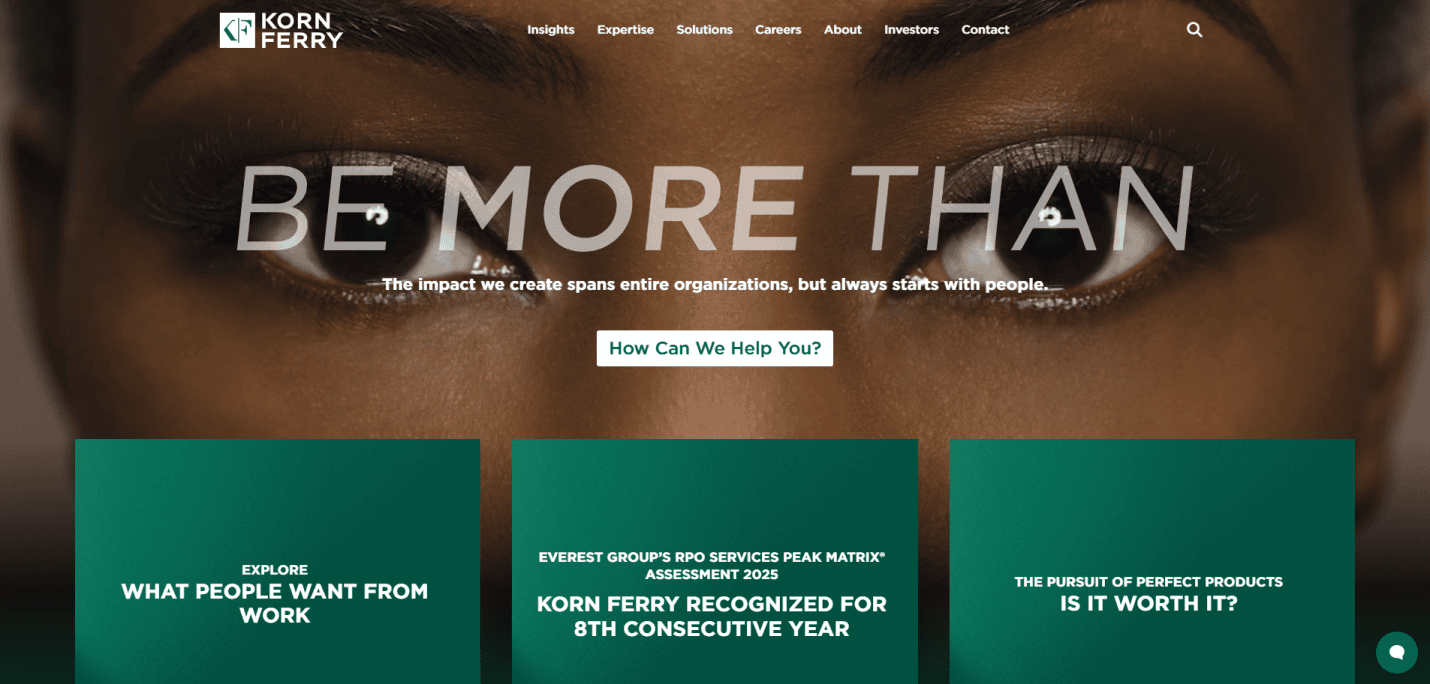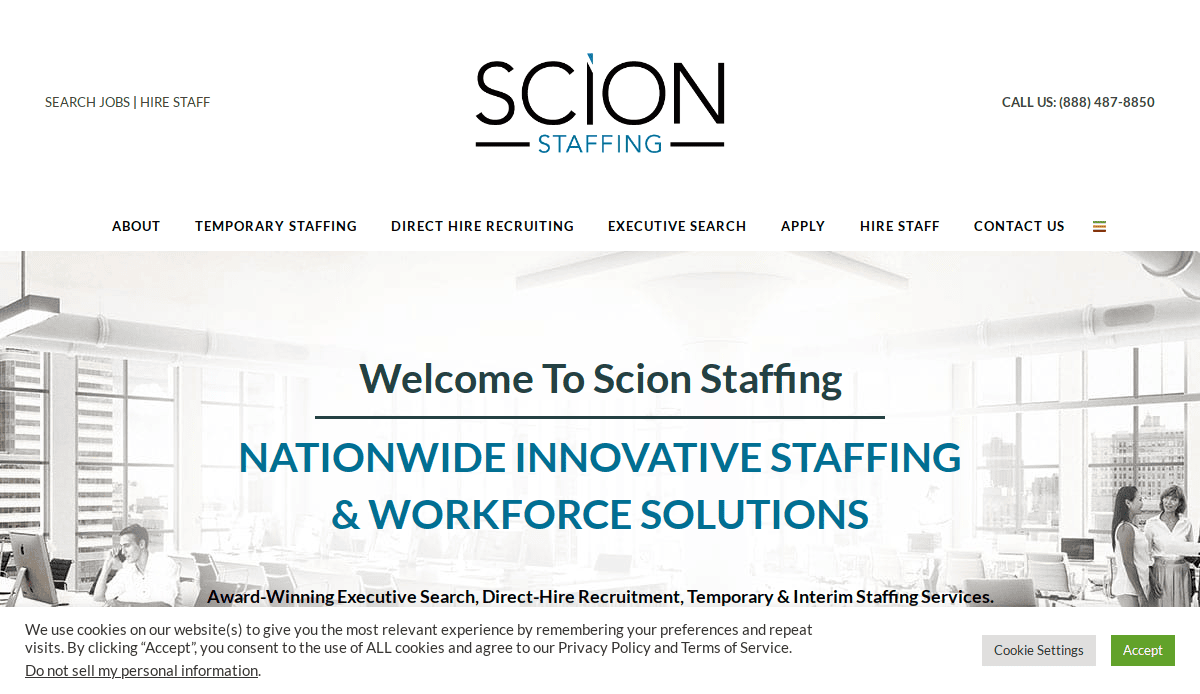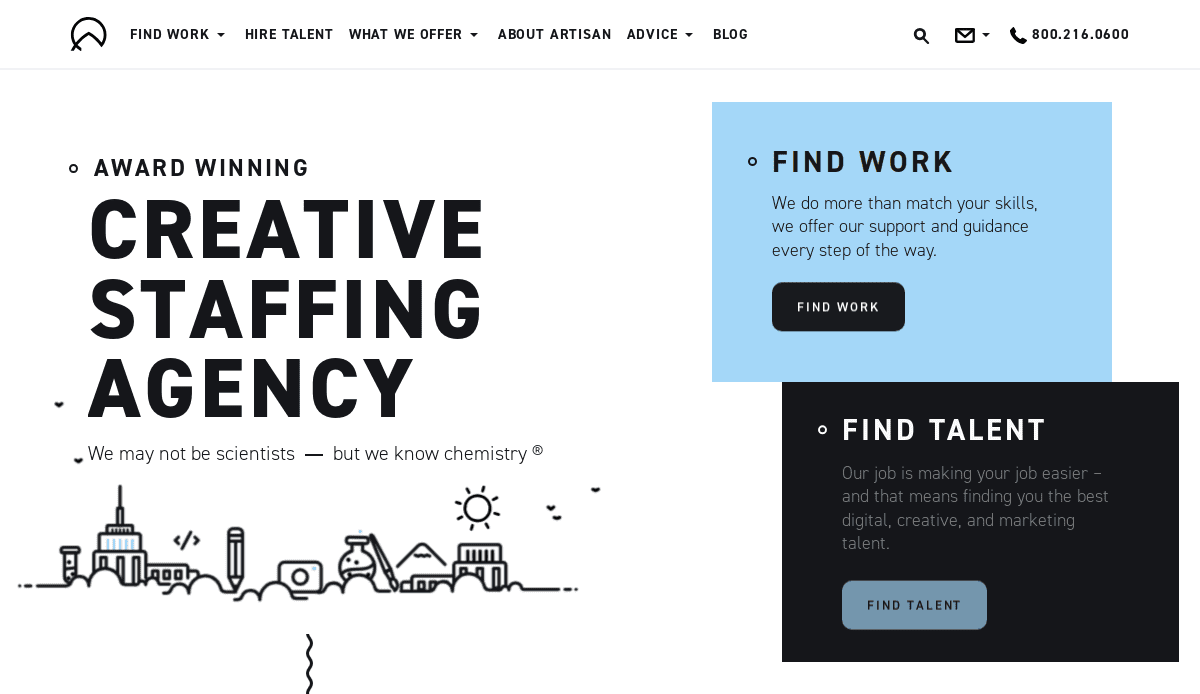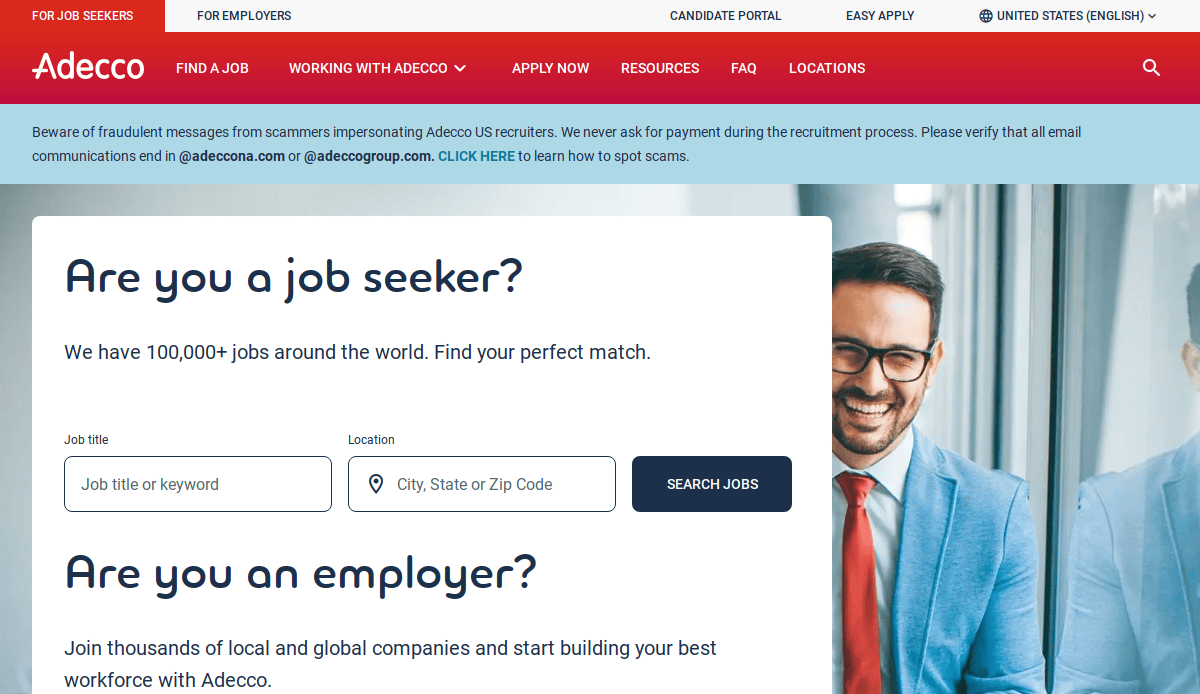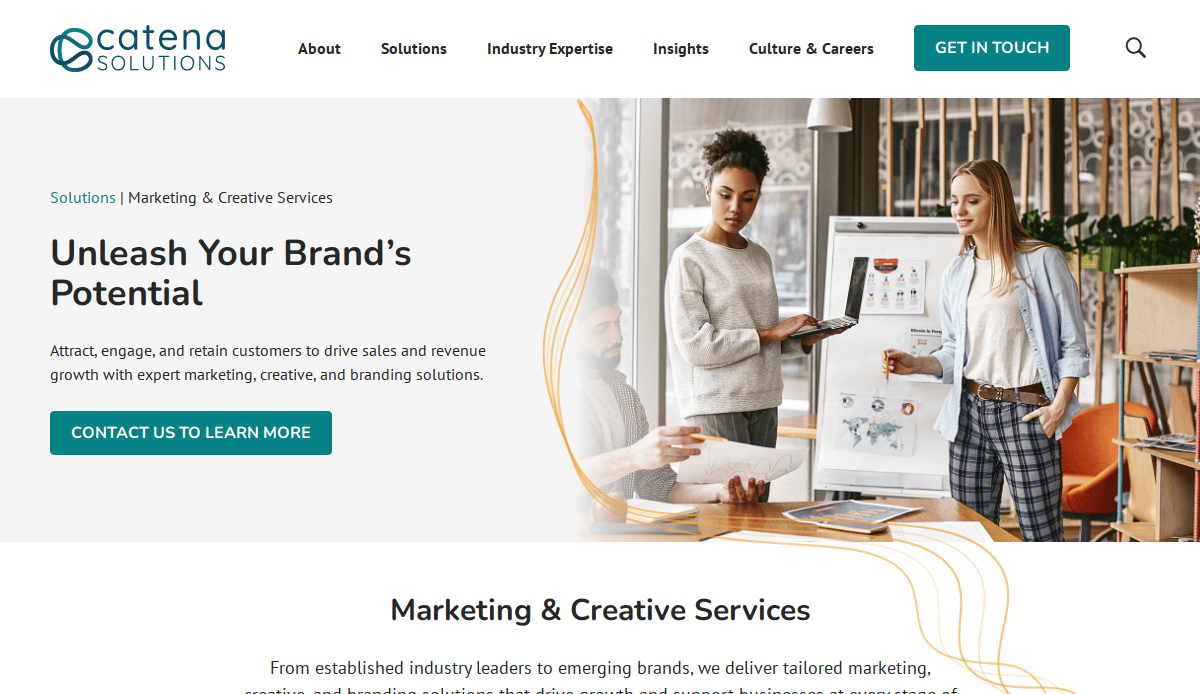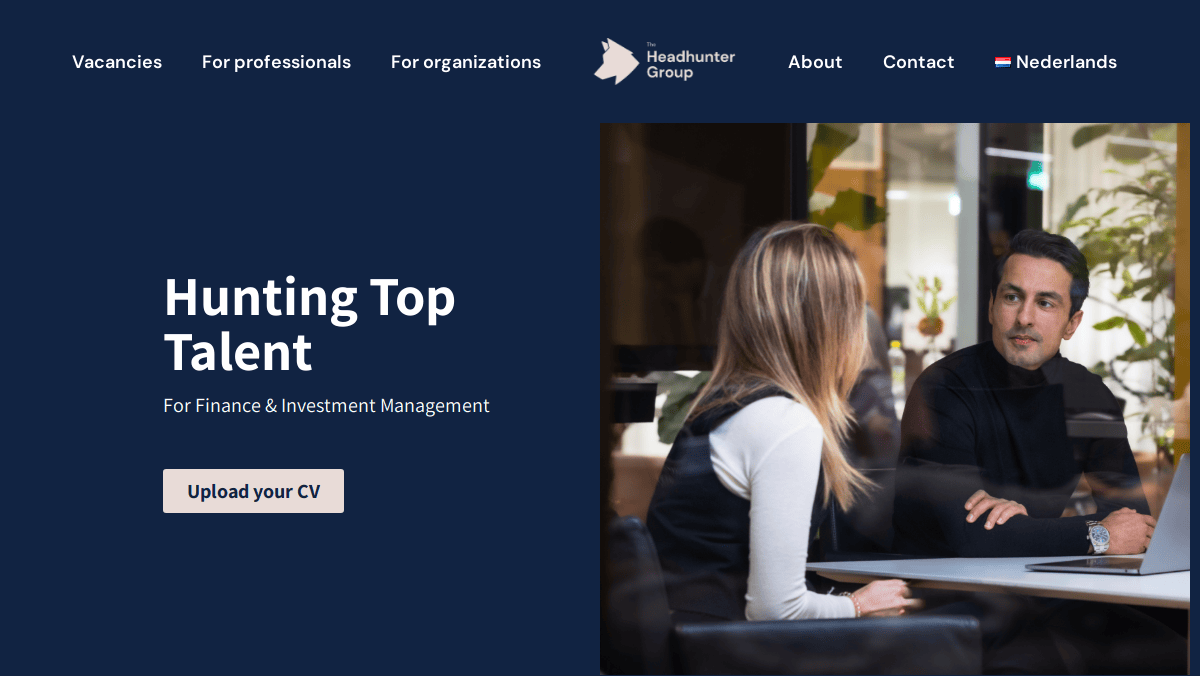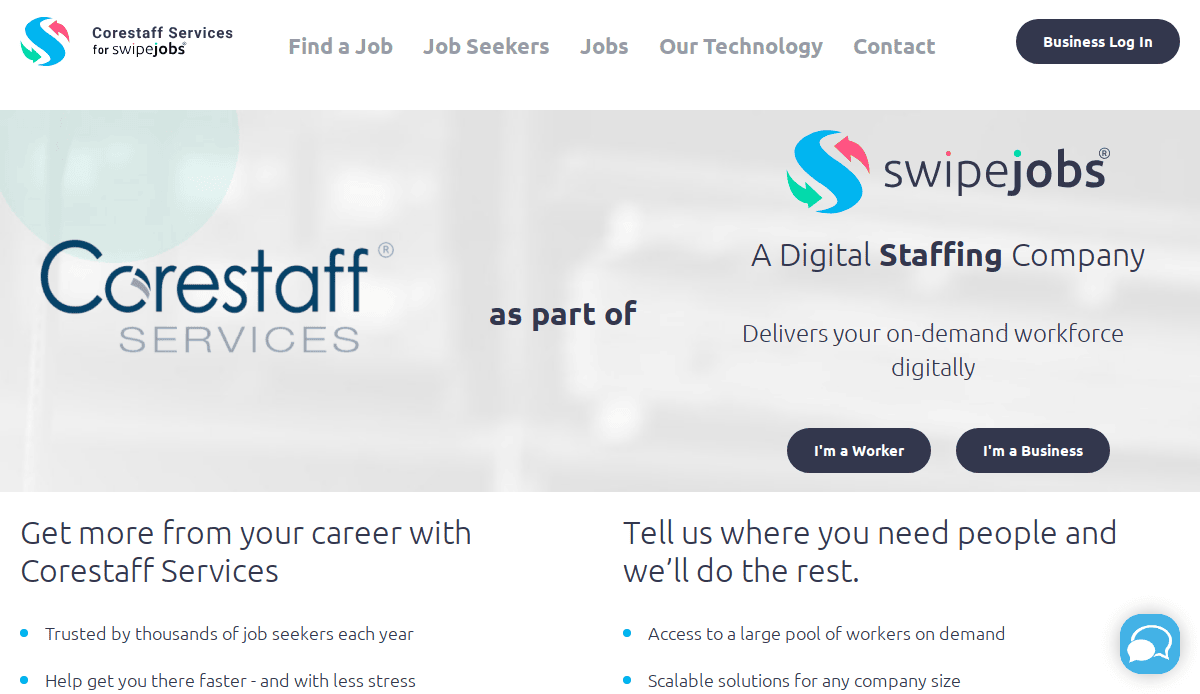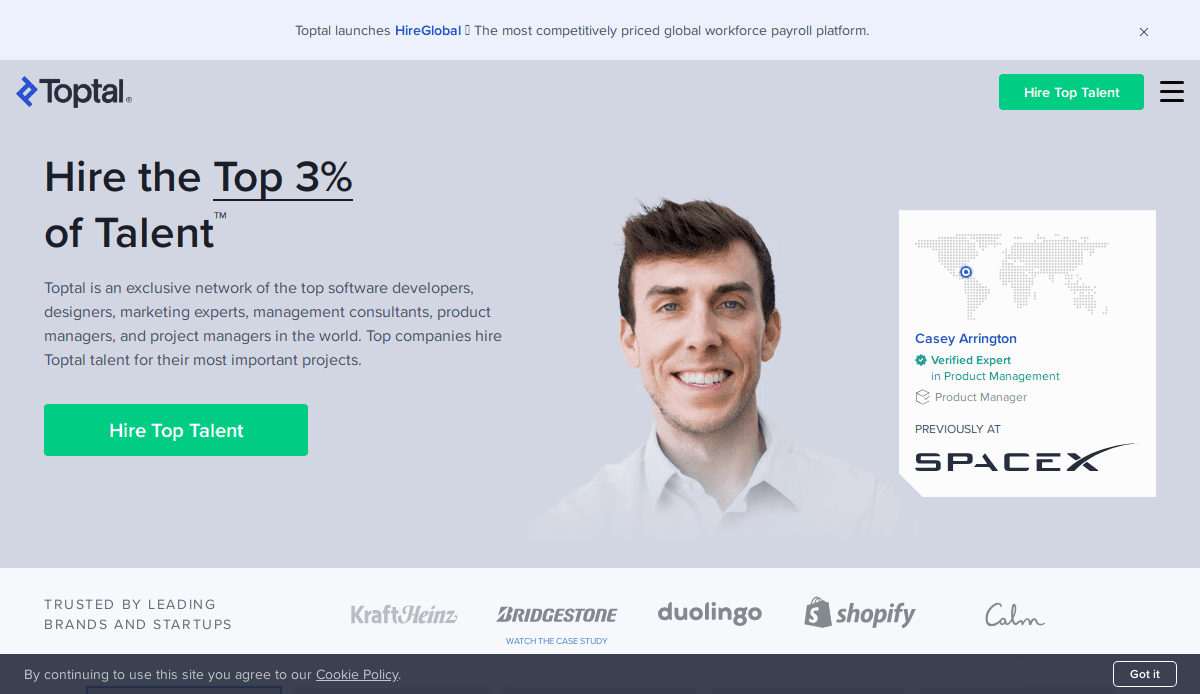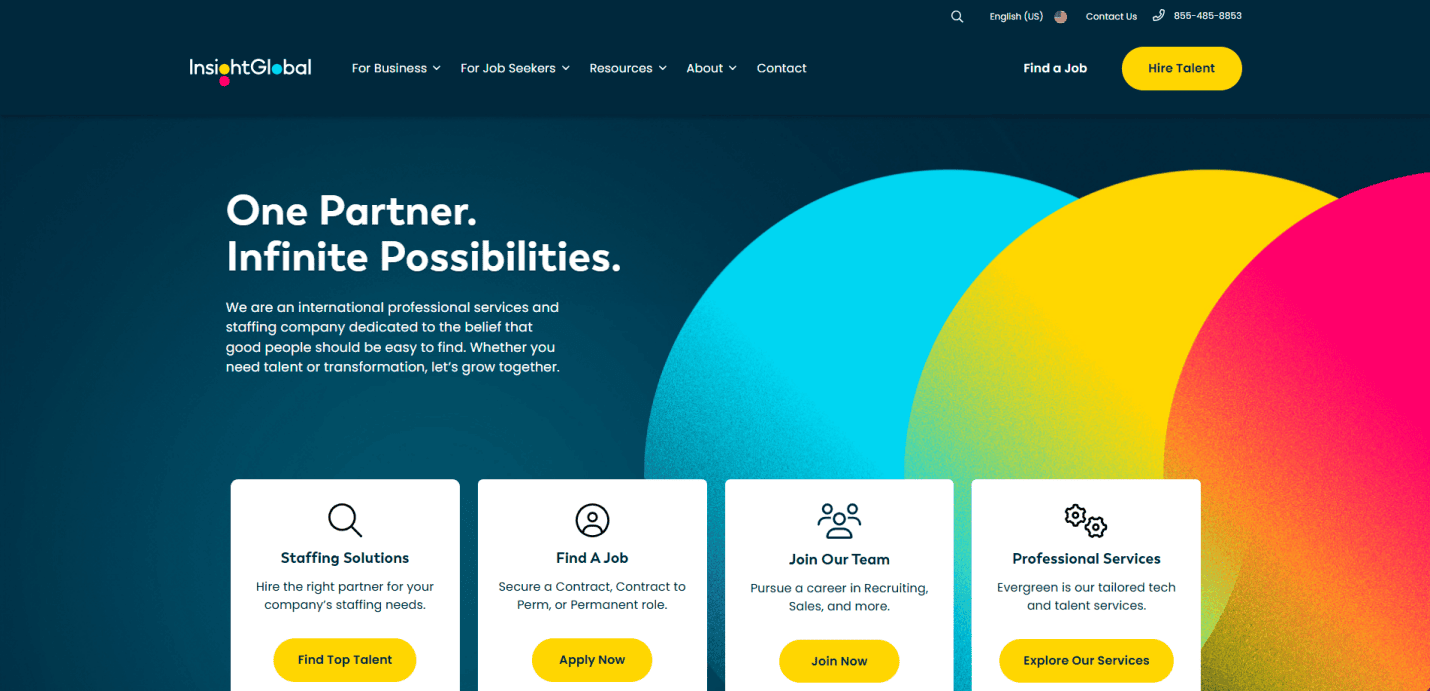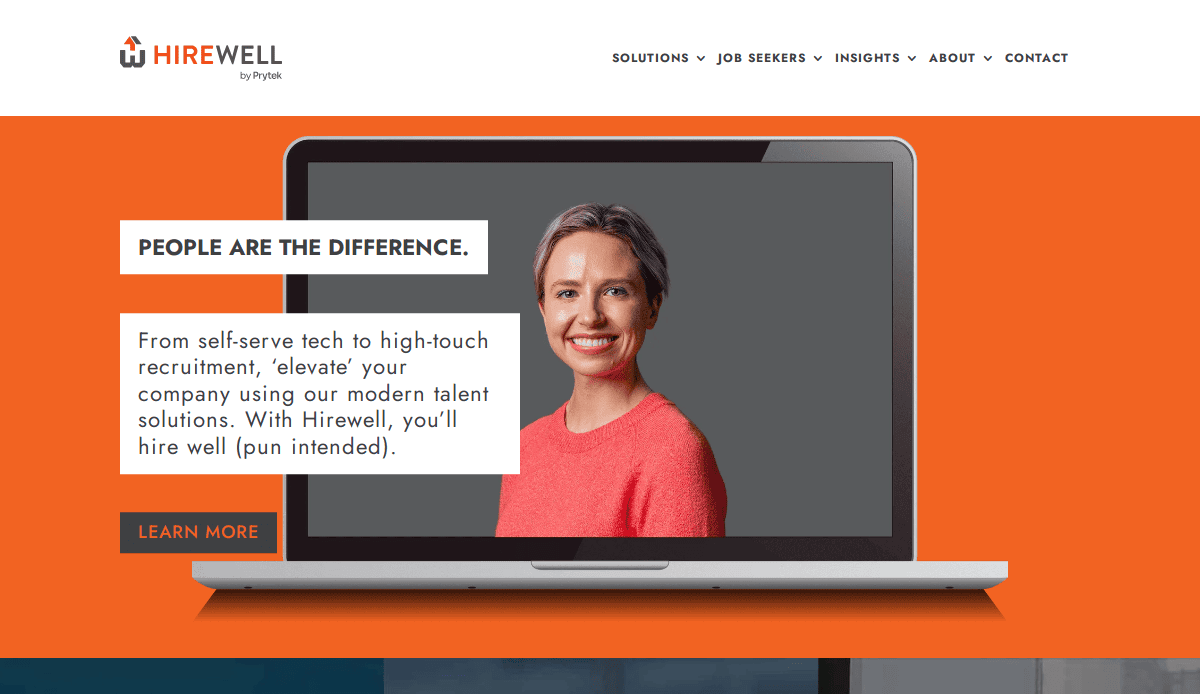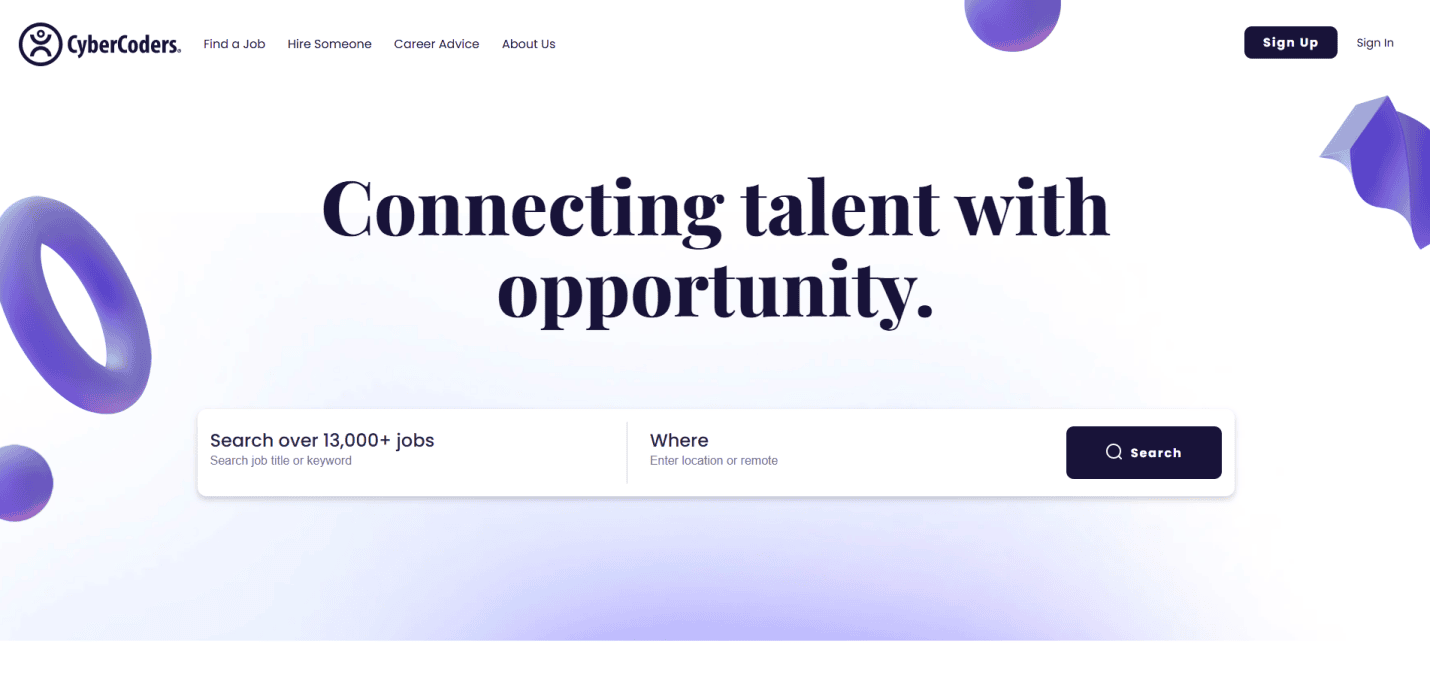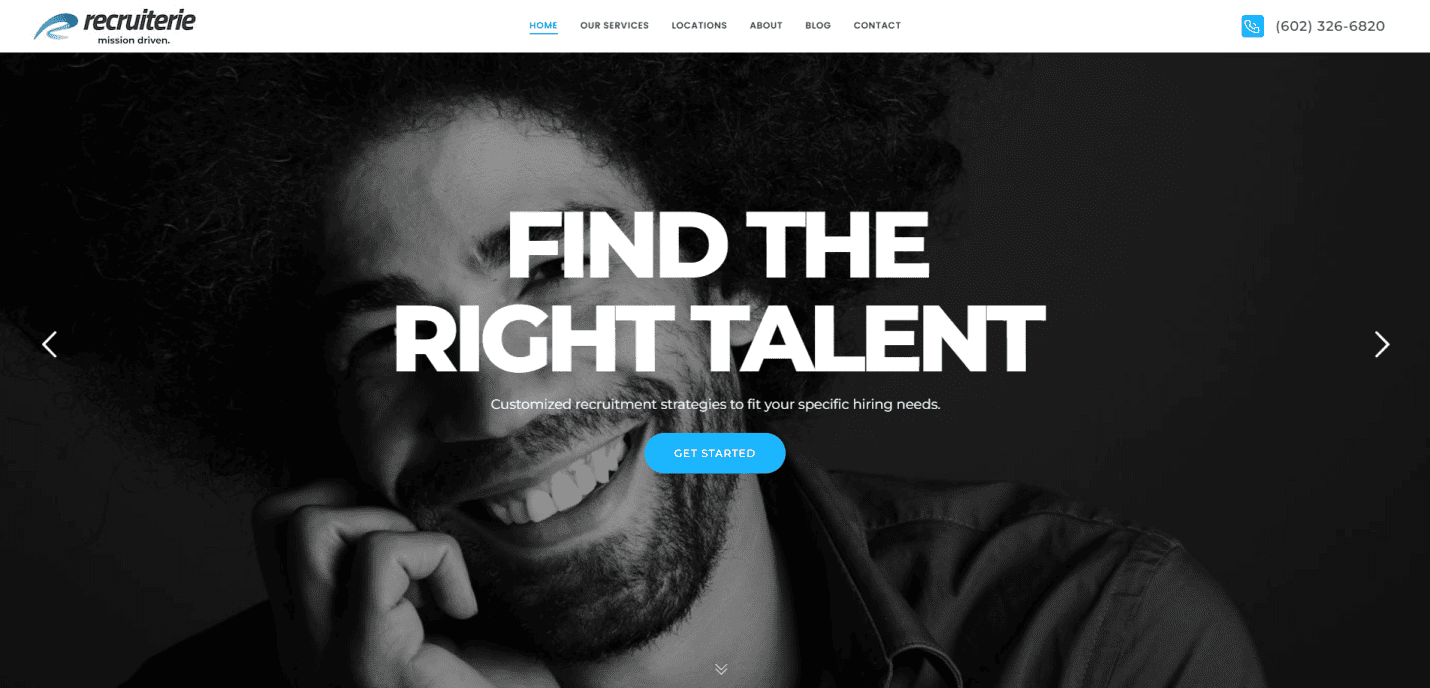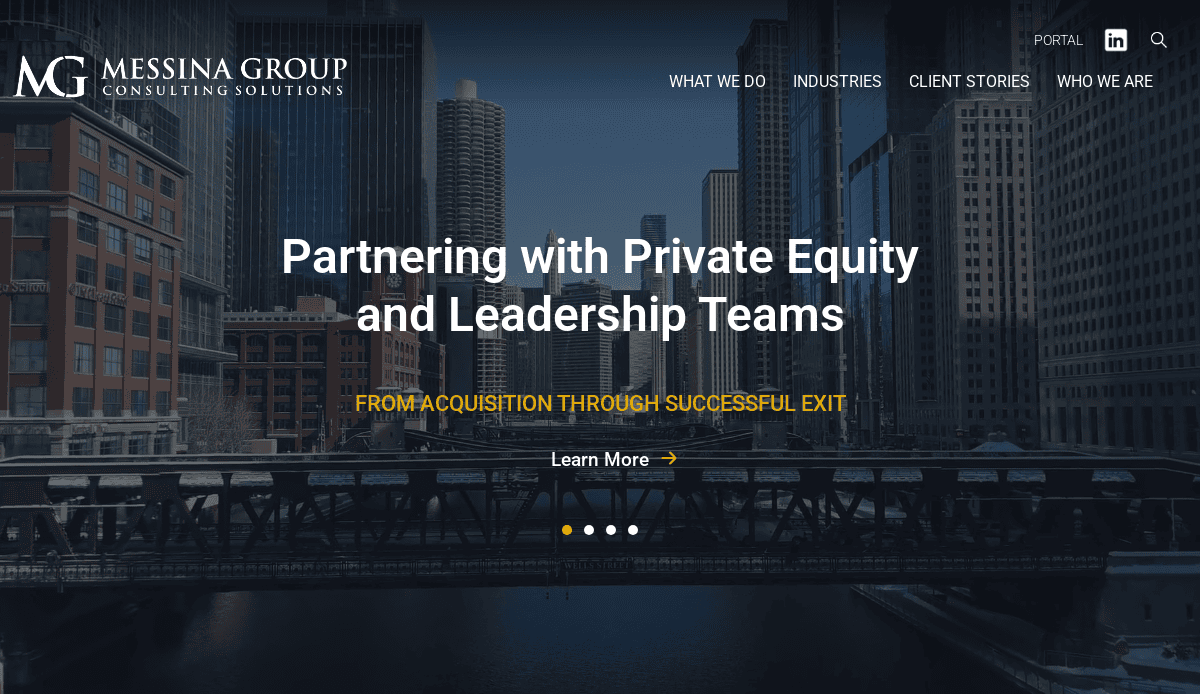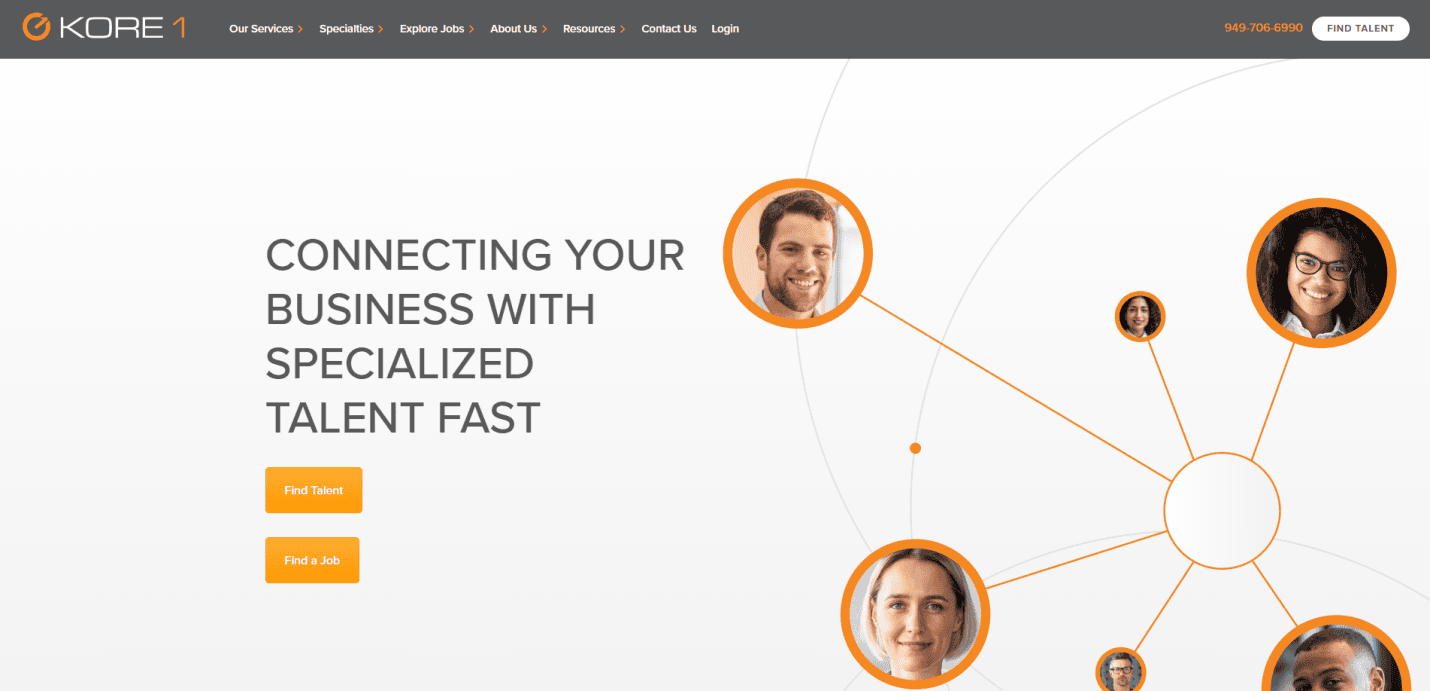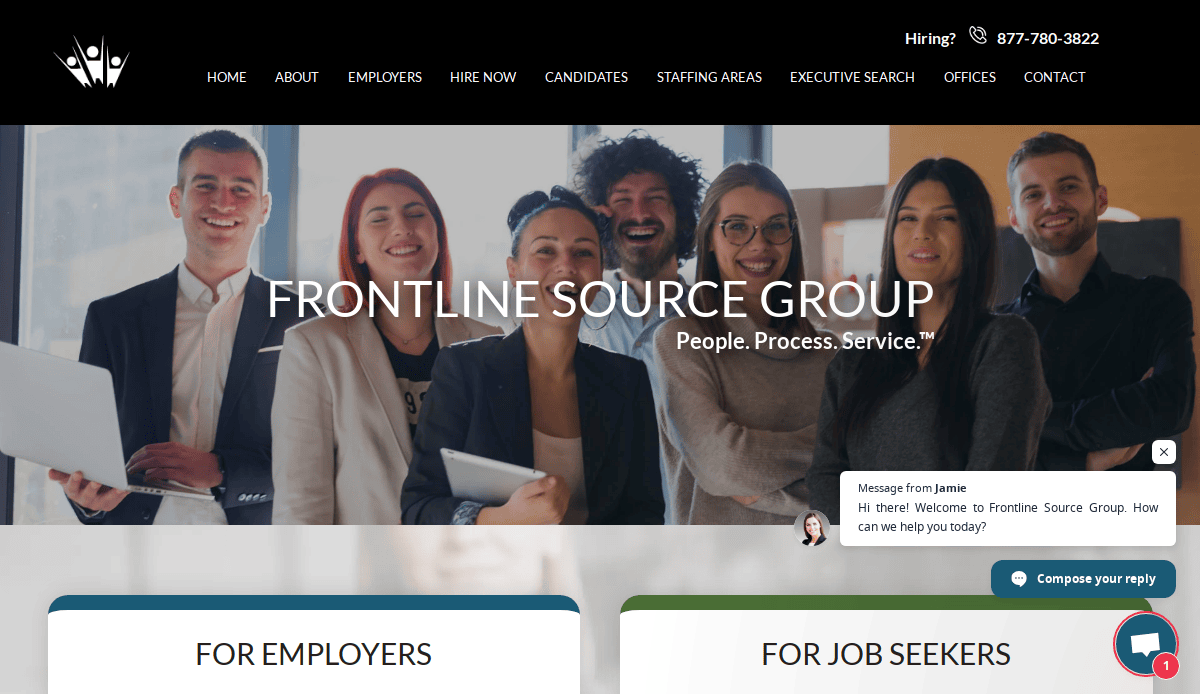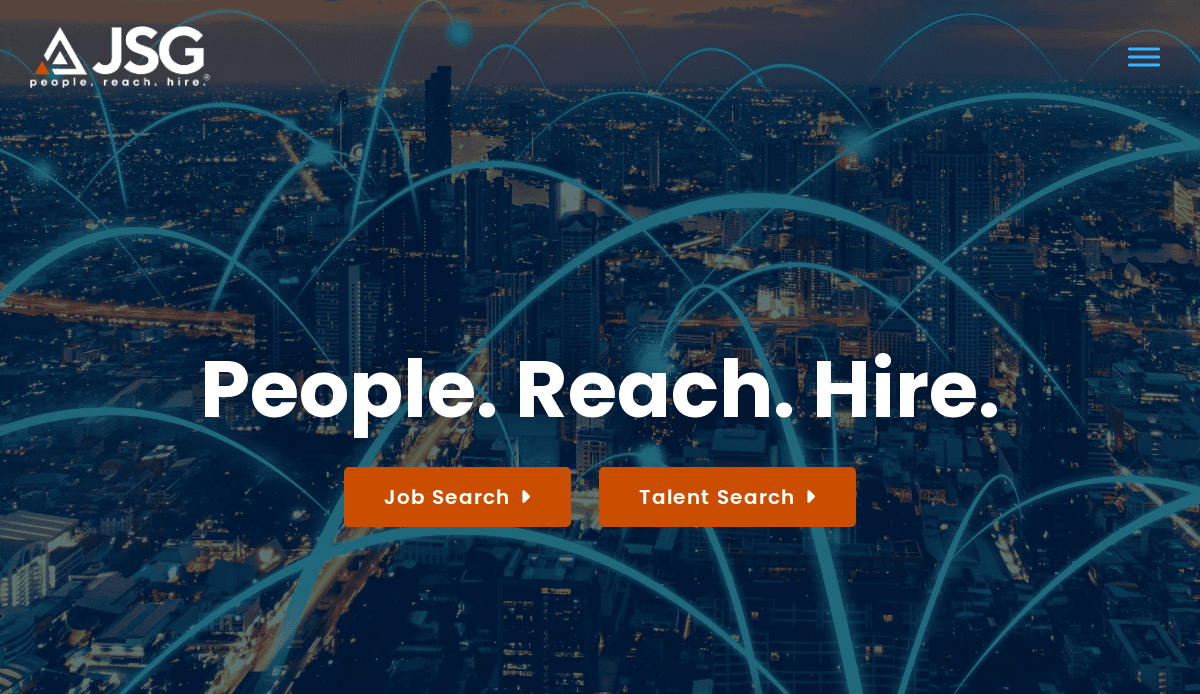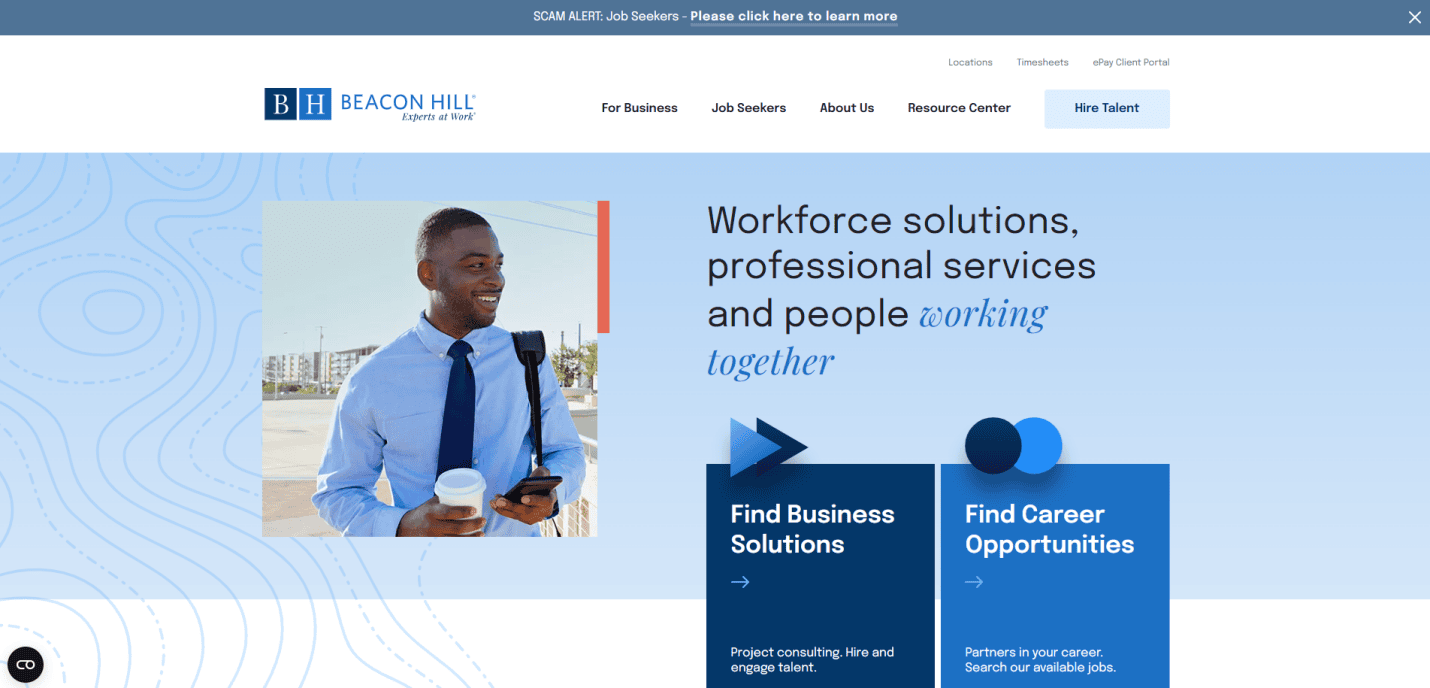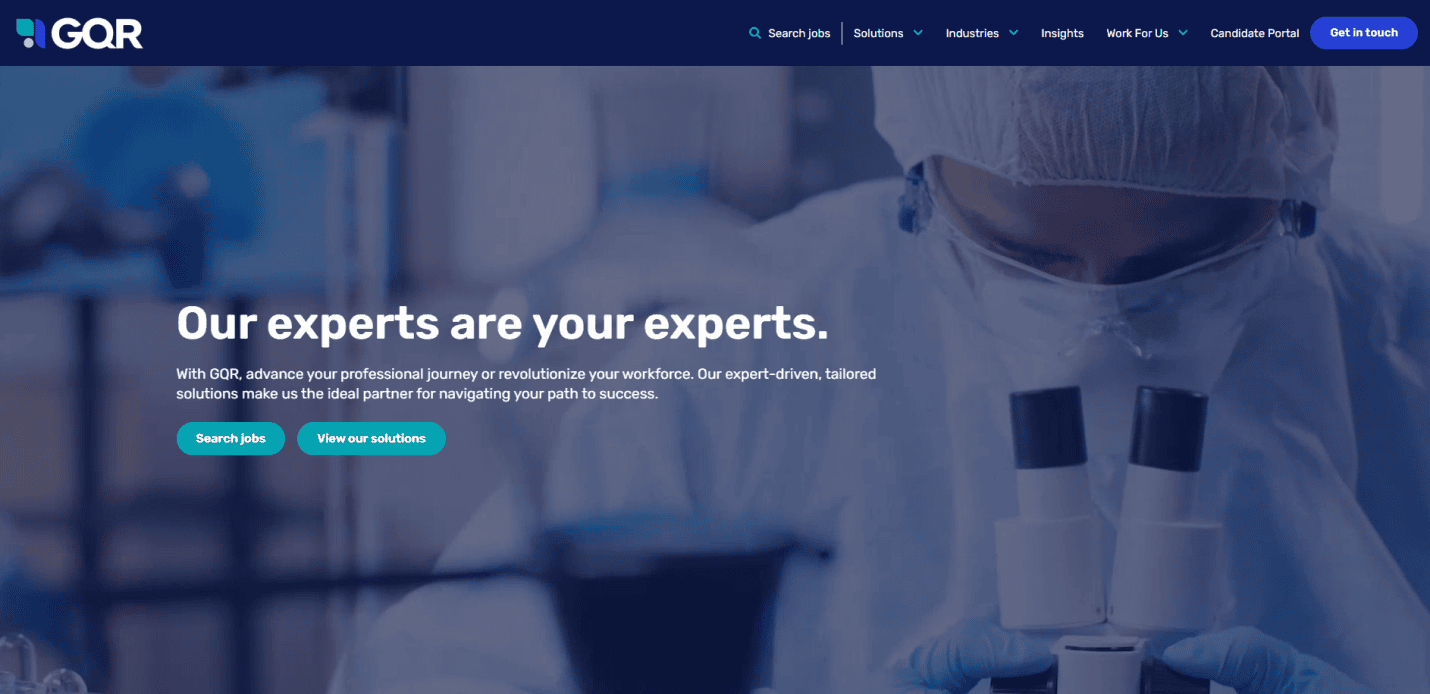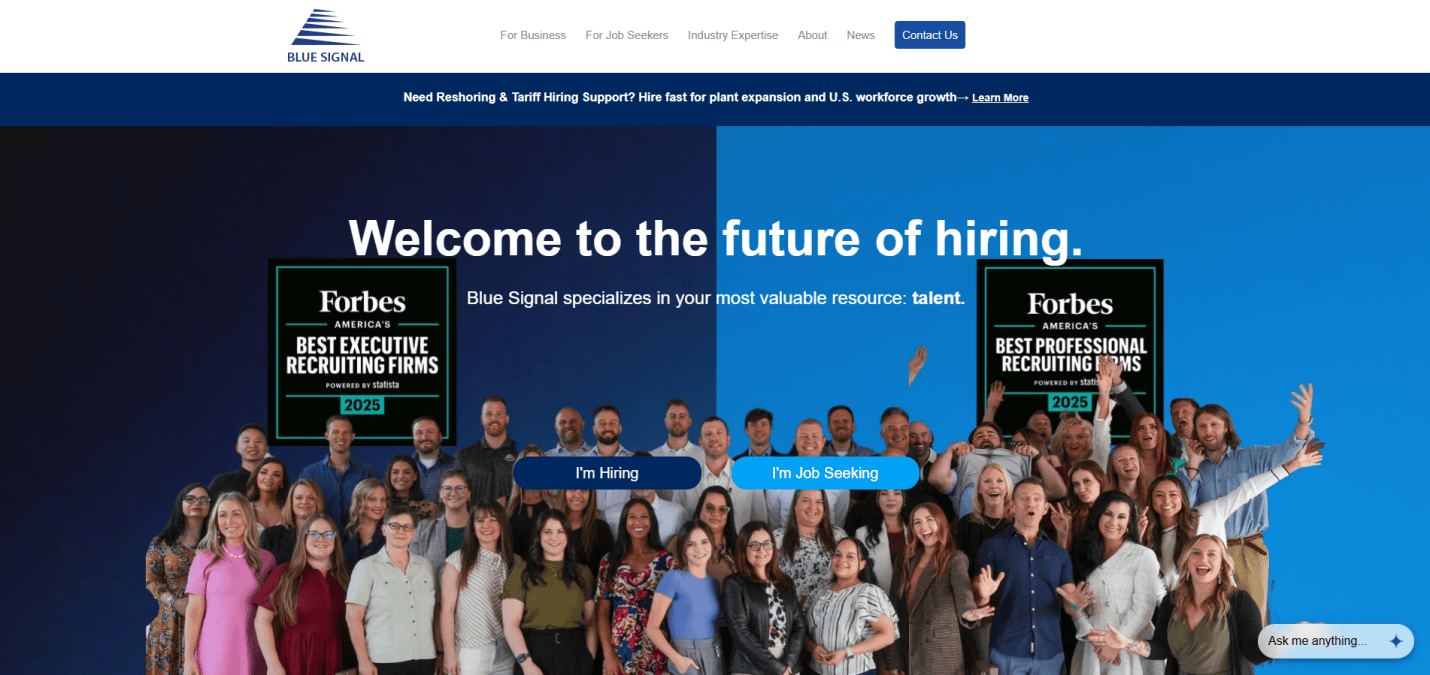Just looking for our Best Staffing Website examples list?
A successful website is no longer just a digital brochure—it’s a lead generation engine, brand statement, and applicant experience platform all in one. This guide breaks down the essential insights to help your agency stand out online.
Key Takeaways:
- A strong website foundation is the cornerstone of recruitment success. Every high-performing recruitment website begins with a clean design, intuitive navigation, mobile responsiveness, and fast load times. Agencies that invest in these foundations provide a smoother experience for both job seekers and employers, leading to higher engagement and trust.
- Your website design must support both employer branding and candidate conversion. Websites need to communicate credibility to hiring companies while offering frictionless job search tools for candidates. Custom landing pages, engaging visuals, and differentiated messaging for each audience segment are vital.
- Visual design, copywriting, and SEO work together to attract and convert. Search-optimized content increases visibility, while compelling copy turns that visibility into action. Infused with brand personality and supported by modern visuals and calls to action (CTAs), your site should tell a story that resonates with both employers and candidates.
- Real examples lead to better decisions. We’ve compiled 20 of the best recruitment websites to inspire you. You’ll see what’s working in the industry today and how top agencies are leveraging web design to build trust, increase applications, and win clients.
- Conversion rate optimization separates good from great. From persuasive CTAs to social proof and personalized user flows, optimizing for conversion is a game-changer. Agencies that treat their website like a growth tool—and not just a digital asset—outperform competitors in visibility, engagement, and lead quality.
By following this guide, your recruitment agency can position itself as a modern, trustworthy, and results-driven leader in the competitive hiring landscape.
Why Website Design Is Mission-Critical for Recruitment Agencies
Your website is often the first impression for both candidates and clients. A slow, outdated, or confusing site doesn’t just cost you credibility—it costs you business. Whether you’re sourcing top-tier talent or securing new employer partnerships, your website should be doing the heavy lifting.
A high-performing website does more than look good. It streamlines job searches, showcases your firm’s value, and guides users toward action. It’s built on intentional design, persuasive content, and search engine visibility—elements that directly influence conversion rates, search rankings, and user satisfaction.
This guide is your roadmap to designing a recruitment website that doesn’t just meet expectations—it exceeds them. Let’s break down the foundation, explore the latest design trends, and highlight top-performing recruitment websites to inspire your next move.
Website Planning & Purpose: Laying the Groundwork for Recruitment Success
Before design even begins, a company must establish a strategic blueprint for its website. This planning phase is critical—it defines who the site serves, what it must achieve, and how it will compete.
Define Your Audiences Clearly
Recruitment agencies have two distinct audiences: job seekers and employer clients. Each group requires a tailored user experience. Planning should include mapping out specific user journeys for candidates (e.g., job search, application) and employers (e.g., service overview, lead capture).
Clarify the Website’s Primary Purpose
Whether your agency focuses on niche industries, executive search, or high-volume staffing, your site must clearly communicate its focus. Are you trying to attract more job applicants, win more employer contracts, or both? The answer shapes your content strategy, homepage layout, and call-to-action hierarchy.
Set Measurable Website Goals
Successful planning includes KPIs like application completion rates, employer lead form submissions, or average time spent on job listings. These benchmarks drive future design and marketing decisions.
Align With Brand and Positioning
Your website is your digital storefront. It must reflect your agency’s professionalism, personality, and competitive positioning. During the planning phase, finalize branding elements like tone of voice, value propositions, and visuals.
Structure for Scalability
Recruitment websites often expand, adding new job categories, locations, or blog content. Plan for growth with a flexible CMS, scalable architecture, and SEO-friendly content structure.
Strategic planning is what separates a generic website from one that builds authority, generates leads, and supports long-term growth. Investing time upfront ensures every design decision supports your agency’s goals.
Content & Navigation: Structuring for Seamless Journeys
Once your planning is in place, the next critical phase is organizing content and navigation. The way information is structured impacts how easily users can access what they need and how likely they are to convert.
Create Clear, User-Centric Navigation
Keep the main menu concise and prioritized around user intent. Typical top-level links should include: Home, About, Job Listings, Employers, Candidates, and Contact. Use dropdowns only when necessary, and ensure they work seamlessly on mobile devices.
Develop Audience-Specific Landing Pages
Segment your site based on user types. Candidates should find a dedicated space for job searches, application tips, and FAQs. Employers should encounter a solutions-driven section that details your services, testimonials, and lead capture CTAs. This segmentation improves relevance and conversion.
Prioritize Job Search Accessibility
The job search tool should be immediately visible—ideally on the homepage or in the main navigation. Filtering by industry, location, or job type helps streamline the user experience and increases application rates.
Tell Your Brand Story Throughout
Weave your unique value proposition and brand personality into every page. Use consistent language, visuals, and tone to reinforce trust and familiarity with both employers and candidates.
Balance SEO with Human Readability
Structure your site architecture around keyword clusters like “recruitment agency website,” “recruitment website design,” and “recruiting website.” Use internal linking to reinforce topical relevance while maintaining a natural, reader-friendly flow.
Include Clear Calls to Action (CTAs)
Every page should direct the user toward the next step, whether it’s applying for a job, scheduling a consultation, or exploring service packages. CTAs should be action-oriented, placed above the fold, and styled for visibility.
Effective content and navigation design are not just functional—they’re strategic tools for converting visitors into clients and applicants. A well-structured website guides users effortlessly, builds credibility, and reinforces your agency’s strengths at every step.
Visual Elements: Designing for Impact and Experience
Visual elements are not just aesthetic choices—they are strategic tools that drive user engagement, reinforce brand identity, and guide conversion paths. These elements can determine how quickly and effectively users connect with your business.
Use Clean, Professional Design as a Trust Signal
The visual tone of your site must communicate credibility and professionalism. A clutter-free layout, ample white space, and a restrained color palette help build trust. Avoid design trends that prioritize flash over function; consistency in visual style across all pages is key.
Feature Authentic Imagery and Team Photos
Stock images can feel generic. Where possible, include real photos of your team, office, or client interactions. Authentic imagery humanizes your business and helps establish emotional connections, especially for candidates evaluating culture fit.
Integrate Visual Cues to Guide User Action
Use design elements like arrows, buttons, and color contrasts to lead users through their journey, whether that’s to a job search, an application form, or a contact submission. Visual hierarchy should clearly communicate what to do next.
Support Brand Recognition With Custom Graphics
Use icons, infographics, and branded visuals that reflect your identity. These elements make content more digestible and can visually explain your services, processes, or differentiators at a glance.
Incorporate Video for Deeper Engagement
Short videos—such as agency intros, testimonials, or how-to job application guides—can significantly enhance user experience. Embed them strategically on high-traffic pages without compromising load time.
Optimize for Performance Across Devices
Responsive design ensures visual elements load correctly on all screen sizes. Prioritize fast-loading images and test animations to prevent usability issues. Smooth, seamless visuals keep users engaged regardless of how they access the site.
A website’s visual identity plays a powerful role in shaping perception, building trust, and improving user experience. Strategic design ensures that visuals are not just seen, but felt, understood, and acted upon.
Ongoing WordPress Maintenance: Keeping Your Website Secure and High-Performing
A website is a living asset that requires continuous care. Without ongoing maintenance, even the best-designed WordPress site can become vulnerable to performance issues, security threats, and user frustration.
Regular Software and Plugin Updates
Core WordPress software, themes, and plugins must be updated regularly to patch vulnerabilities and ensure compatibility. Outdated components are one of the leading causes of website breaches.
Scheduled Backups and Recovery Plans
Automated daily or weekly backups ensure your site can be quickly restored in case of a crash or hack. Cloud storage for backups adds an extra layer of reliability.
Performance Monitoring and Optimization
Monitoring site speed and uptime is essential. Slow load times can deter job seekers and clients. Optimize images, leverage caching, and review database performance routinely to keep things running smoothly.
Security Hardening and Monitoring
Implement security plugins, enable firewall protection, and regularly scan for malware. Login attempt monitoring and two-factor authentication add layers of defense against unauthorized access.
Form and Functionality Testing
Job application forms, contact fields, and search filters must be tested periodically to ensure they function as intended. Broken forms can result in missed leads and a poor user experience.
Content Audits and SEO Health Checks
Routine checks for broken links, outdated job listings, and SEO performance keep the site fresh and visible. Ensuring content accuracy helps maintain credibility and search rankings.
Compliance and Accessibility Updates
As regulations evolve, recruitment websites must adapt to maintain ADA compliance and data privacy laws. Regular reviews ensure ongoing alignment with legal standards.
Ongoing maintenance isn’t optional—it’s the backbone of long-term website success. A proactive maintenance strategy ensures your recruitment site remains secure, fast, and effective in meeting business goals.
20 Recruitment Web Designs to Inspire You
Below are 20 standout recruitment agency websites, including five built by CyberOptik, that showcase effective design, strong communication, and results-driven features.
1. LaSalle Network – Chicago, IL
- Clean layout with clear navigation for job seekers and employers
- Prominent CTA buttons drive conversions
- Modern visuals support their professionalism
2. Lucas Group – Atlanta, GA
- Robust search tools for job seekers
- Focused industry navigation improves user flow
- Well-structured service pages cater to corporate clients
3. Scion Staffing – San Francisco, CA
- Diversity-first branding throughout visuals and copy
- Streamlined candidate experience via job filter options
- Clear communication of values builds trust
4. Artisan Talent – Chicago, IL
- Creative, engaging design supports marketing niche
- Interactive job board for fast applications
- Effective use of whitespace improves readability
5. Adecco USA – Jacksonville, FL
- Corporate polish with simplicity
- Accessible layout and strong job seeker tools
- Trust signals through testimonials and stats
6. WunderLand Group – Chicago, IL
- Custom job portal integration for easy job search
- Creative elements enhance recruiters’ identity
- Optimized mobile experience increases engagement
7. Headhunter Group – Miami, FL
- Direct CTAs support conversions
- Industry-specific navigation simplifies browsing
- Polished design with strong messaging
8. Core Staffing – New York, NY
- Professional tone with modern elements
- Simple navigation and job listings
- Focus on city-specific placements
9. Toptal – San Francisco, CA
- Freelance focus with elegant UX
- Global reach with detailed filters
- Identity strength through high-quality visuals
10. Insight Global – Atlanta, GA
- Robust team-focused branding
- Interactive design and scrolling sections
- Streamlined candidate sourcing workflows
11. Hirewell – Chicago, IL
- Job seekers focus on smart navigation
- Well-positioned CTAs and social proof
- Engaging visual identity
12. CyberCoders – Irvine, CA
- Bold color palettecatches attention
- Efficient job browsing and mobile UX
- Emphasis on recruiter bios builds a connection
13. Recruiterie – Phoenix, AZ
- Niche B2B focus and clear value prop
- Conversion-optimized homepage
- SEO-friendly content layout
14. Messina Group – Chicago, IL
- Clean, modern design for a B2B audience
- Detailed service pages and visuals
- Effective employer/candidate segmentation
15. KORE1 – Irvine, CA
- Industry-specific job listings
- Strong CTAs and employer pitch
- Sharp visuals and value clarity
16. Frontline Source Group – Dallas, TX
- Easy access to job postings
- Use of testimonials for credibility
- Well-branded interface
17. Johnson Service Group – Chicago, IL
- Responsive, intuitive design
- Organized job browsingby sector
- Smooth candidate application process
18. Beacon Hill Staffing – Boston, MA
- Professional, authoritative tone
- Polished visuals and branding
- Extensive resource hub for visitors
19. GQR – Los Angeles, CA
- Elegant design with professional appeal
- Well-placed calls to action
- Clean structure with mobile-first design
20. Blue Signal Search – Phoenix, AZ
- Focus on executive search and niche markets
- Compelling storytelling and use of testimonials
- SEO-enhanced layout and copy
Build a Recruitment Website That Delivers Real Results
Now is the time to build a recruitment website that truly supports your business goals. Whether you’re launching your first recruiting website or upgrading a legacy platform, every design decision should be driven by strategy and backed by results.
Recruitment and staffing firms need more than a good-looking site—they need a bold website built for performance. That means using the right website template or website builders that streamline your workflow, integrating a website platform that supports SEO and analytics, and designing a navigation menu that’s easy to navigate for all users. From compelling headers and font pairings to intuitive job postings and simple design principles, every detail matters.
The best website designs incorporate modern elements like sliders, accessible layouts, and mobile responsiveness to elevate the candidate experience. Staffing agencies competing for top talent must prioritize fast-loading pages, clear CTAs, and content that speaks to both clients and candidates. A well-planned recruitment web design doesn’t just support your marketing strategy—it attracts new clients, drives job openings, and amplifies your business in a crowded digital space.
If you’re ready to build your recruitment website with a proven design agency that helps recruiters succeed, contact us today and take the first step toward making your website a true growth engine.
Answers to Common Recruitment Website Questions
What pages should every recruitment website include?
A well-structured website should include Home, Job Listings, About, Employers, Candidates, and Contact pages. Including a blog focused on recruitment marketing and a section for frequently asked questions can improve SEO and better guide website visitors.
How can a recruitment website attract both candidates and potential clients?
Segment your content strategy and landing pages by audience. Use messaging and calls to action tailored to job seekers and hiring managers. This approach helps generate leads while showcasing your agency’s talent acquisition expertise.
Do I need custom web development, or can I use a website builder?
It depends on your needs. Website builders can work for smaller firms, but growing staffing businesses typically benefit from custom web development to support functionality, speed, and scalability. Our web development services help agencies design flexible, performance-driven websites.
What are the best ways to make your site stand out in a crowded market?
Invest in unique branding, an effective tagline, and website themes that reflect your agency’s personality. Clear design, valuable content, and an easy-to-use interface are critical. Include interactive elements that make your website fun and informative.
How often should job postings be updated?
Regular updates show activity and improve SEO. Automate job feed updates if possible, or assign someone to refresh postings weekly to keep the site current for candidates seeking a new career.
How can I improve my recruitment website’s visibility online?
Use an integrated digital marketing strategy that includes SEO, content creation, and paid ads. Well-structured site architecture and keyword-focused pages help increase organic traffic.
Is WordPress a good platform for recruitment websites?
Yes, WordPress offers flexibility, integrations, and a wide selection of plugins. It’s ideal for search firm websites, staffing agencies, and SaaS recruitment platforms looking to grow efficiently.
What’s the best way to showcase services for candidate sourcing?
Use visuals, case studies, and stats on your service pages. Provide clarity on how your agency supports talent acquisition and show examples of successful placements.
Should my recruitment website offer downloadable resources?
Yes, offering website content like salary guides, interview tips, or onboarding checklists helps establish authority and captures lead information for future marketing efforts.
Can the look and feel of a website affect conversions?
Absolutely. Fonts, white space, responsive design, and simple navigation all play a role. Sites that are easy on the eyes and provide a clear path to action convert better. Partnering with a design agency experienced in recruitment ensures every design choice supports business goals.


